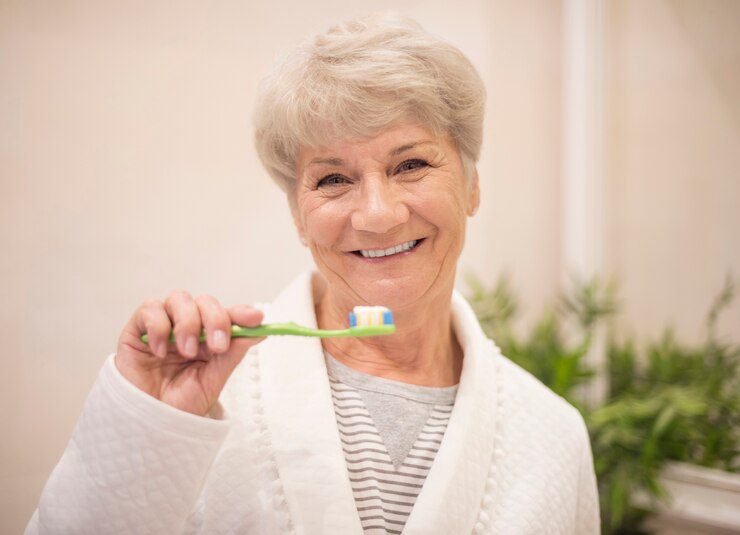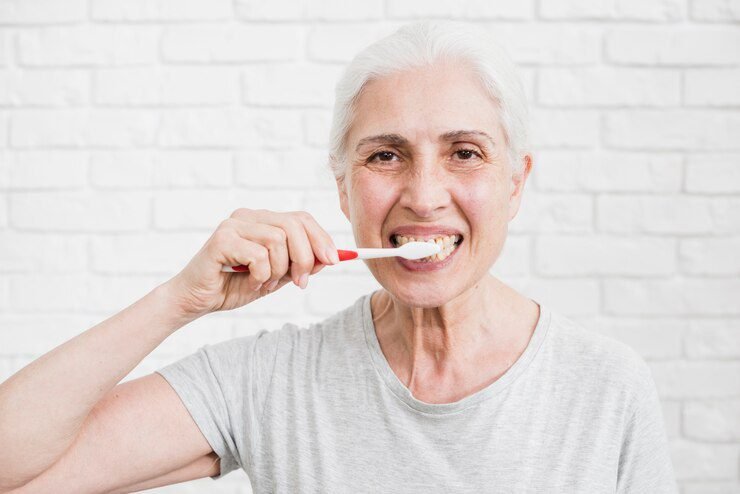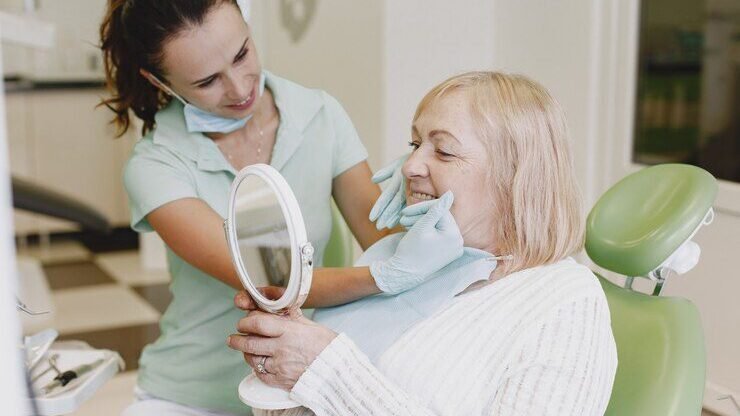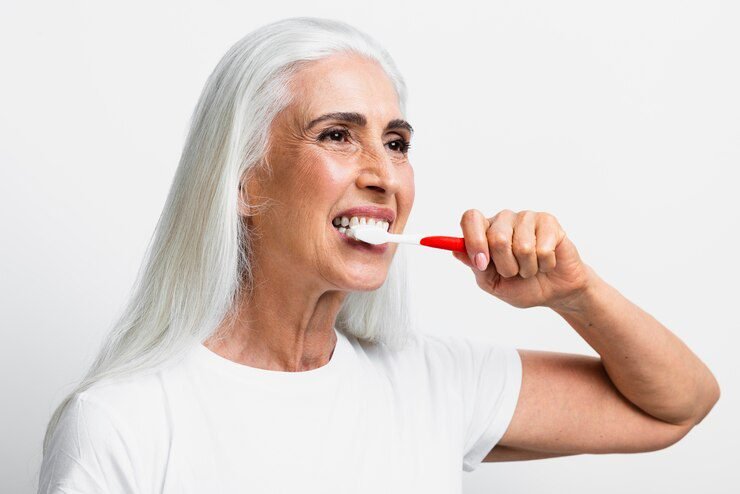Physical Address
304 North Cardinal St.
Dorchester Center, MA 02124
Physical Address
304 North Cardinal St.
Dorchester Center, MA 02124

Maintain a healthy smile throughout life with these oral care tips.

As you grow older, taking care of your dental health becomes increasingly important. A healthy mouth not only allows you to eat and speak properly, but it also plays a crucial role in your overall well-being. Neglecting dental care can lead to a range of issues, from cavities and gum disease to tooth loss and even systemic health problems. Therefore, it is crucial to prioritize dental care as part of your overall healthcare routine.
Maintaining good oral hygiene is the foundation of dental health as you age. Regular brushing, flossing, and using mouthwash is essential in preventing the buildup of plaque and bacteria, which can lead to gum disease and tooth decay. It is recommended to brush your teeth at least twice a day with a soft-bristled toothbrush and fluoride toothpaste. Additionally, flossing daily and incorporating interdental cleaning aids, such as interdental brushes or water flossers, can help remove food particles and plaque from between your teeth and along the gumline. By following these simple yet crucial steps, you can maintain the health of your teeth and gums as you age.

As we age, our dental health needs change, and older adults often face common dental issues that require special attention. One of the most prevalent problems is tooth decay. This can occur due to a variety of factors, including a lifetime of poor oral hygiene habits, dry mouth caused by certain medications, and an increased intake of sugary foods and drinks. Cavities can be painful and lead to further complications if left untreated, such as dental infections or gum disease.
Gum disease, or periodontal disease, is another common dental issue faced by older adults. It is caused by the buildup of plaque and bacteria along the gumline, which can lead to inflammation, bleeding, and even tooth loss if not addressed. Aging individuals may also be at a higher risk for gum disease due to factors such as weakened immune systems, hormonal changes, and the presence of other chronic health conditions like diabetes. Regular dental check-ups and good oral hygiene practices, such as brushing and flossing daily, can help prevent and manage gum disease.

Maintaining optimal oral hygiene plays a crucial role in preserving dental health as you age. Regularly brushing your teeth, using dental floss, and incorporating mouthwash into your routine are fundamental practices for oral hygiene. These actions remove dental plaque and food particles that, if left unattended, can lead to gum disease, tooth decay, and bad breath.
To effectively maintain dental health, it is recommended to brush your teeth twice a day, using a fluoride toothpaste and a soft-bristled toothbrush. The toothbrush should be replaced every three to four months or sooner if the bristles become frayed. Paying attention to proper brushing techniques, such as using gentle circular motions and reaching all surfaces of your teeth, can enhance the cleansing process and prevent oral health issues.\n
Furthermore, do not underestimate the importance of flossing and interdental cleaning. These practices help remove plaque in hard-to-reach areas between teeth and along the gumline. Flossing should be done at least once a day, using a gentle sawing motion and a clean section of floss for each tooth. Interdental brushes or water flossers can also aid in maintaining oral hygiene, especially for individuals with braces or other dental appliances. By incorporating these practices into your daily routine, you can significantly reduce the risk of dental problems and maintain a healthy smile for years to come.
Maintaining good oral hygiene is essential for seniors in order to prevent dental issues and maintain overall oral health. Proper brushing techniques play a crucial role in ensuring the cleanliness of the teeth and gums. To effectively brush their teeth, seniors should start by choosing a toothbrush with soft bristles to prevent gum irritation. The toothbrush should be held at a 45-degree angle towards the gum line and moved gently in a circular motion. It is important to brush all sides of the teeth, including the front, back, and chewing surfaces, for a thorough clean. Seniors should take their time and brush for at least two minutes, twice a day, in order to remove plaque and prevent tooth decay and gum disease. It is also important to replace the toothbrush every three to four months or sooner if the bristles become frayed.
Here’s a table summarizing brushing techniques for seniors:
| Brushing Technique | Description | Credible Source |
|---|---|---|
| Choose the Right Toothbrush | Select a soft-bristled toothbrush with a small head to reach all areas of the mouth comfortably, especially if experiencing gum recession or tooth sensitivity. | American Dental Association (ADA): Link |
| Brush Gently and Thoroughly | Use gentle, circular motions to brush the teeth and gums thoroughly, aiming to clean all surfaces and remove plaque and food debris without causing irritation or damage. | Mayo Clinic: Link |
| Pay Attention to Technique | Hold the toothbrush at a 45-degree angle to the gums and brush with short, back-and-forth strokes, focusing on each tooth individually and paying attention to hard-to-reach areas. | National Institute on Aging (NIA): Link |
| Clean Dentures Properly | If wearing dentures, remove them for cleaning and brush them with a denture brush and mild soap or denture cleaner. Rinse thoroughly before reinserting into the mouth. | American College of Prosthodontists (ACP): Link |
| Rinse and Store Properly | After brushing, rinse the mouth thoroughly with water or mouthwash to remove any remaining debris. Store toothbrushes in an upright position and allow them to air dry. | Centers for Disease Control and Prevention (CDC): Link |
Flossing and interdental cleaning are essential components of a comprehensive oral hygiene routine, particularly for older adults. While daily brushing helps remove plaque and debris from the surfaces of the teeth, flossing and interdental cleaning target the spaces between the teeth and along the gumline that are difficult to reach with a toothbrush alone. By incorporating these practices into your daily routine, you can reap numerous benefits for your oral health.
One of the key benefits of flossing and interdental cleaning is the removal of plaque buildup in those hard-to-reach areas. Plaque is a sticky film that contains bacteria and can lead to tooth decay and gum disease if not properly removed. Regular flossing and interdental cleaning help remove plaque, reducing the risk of developing these oral health issues. Additionally, these practices can help prevent bad breath by removing food particles and bacteria that contribute to oral malodor. By making flossing and interdental cleaning a habit, you can effectively maintain the health of your teeth and gums as you age.
A balanced diet plays a crucial role in maintaining optimal oral health, particularly as we age. By providing essential nutrients, vitamins, and minerals, a well-balanced diet can help strengthen teeth and gums, promote healthy saliva production, and reduce the risk of dental issues.
To support oral health, it is important to consume a variety of foods from different food groups. Foods rich in calcium, such as dairy products, leafy greens, and fortified beverages, can help strengthen tooth enamel and prevent tooth decay. Vitamin C, found in citrus fruits, broccoli, and peppers, supports healthy gums and aids in the prevention of gum disease. Additionally, foods high in phosphorus, such as lean meats, fish, eggs, and nuts, contribute to the development and maintenance of tooth structure. By incorporating a range of these nutrient-dense foods into our diets, we can ensure that our oral health remains in top shape.
However, it is equally important to limit the consumption of sugary foods and beverages, as they can contribute to tooth decay and cavities. High levels of sugar provide nourishment for harmful bacteria in the mouth, leading to the production of acids that erode tooth enamel. Opting for healthier alternatives, such as fruits, vegetables, and whole grains, can help reduce the risk of dental issues. In addition, staying hydrated by drinking water throughout the day can promote saliva production, which acts as a natural defense against harmful bacteria.
Many older adults rely on various medications to manage chronic health conditions. While these medications can provide relief and improve overall health, they can also have an impact on dental health. Certain medications can cause side effects that affect the mouth, teeth, and gums. For example, some medications may cause dry mouth, which can lead to an increased risk of tooth decay. Additionally, certain medications may interfere with blood clotting, increasing the chances of bleeding after a dental procedure. It is crucial for older adults to be aware of the potential impact of their medications on their dental health and to work closely with their dentist to mitigate any adverse effects. Regular communication between healthcare professionals and the patient is essential to ensure that the appropriate dental care measures are taken to safeguard oral health while managing chronic health conditions.
Regular dental check-ups are crucial for maintaining good oral health, particularly as we age. These check-ups allow dentists to detect and address potential issues before they escalate into more serious problems. During a regular check-up, the dentist will thoroughly examine your teeth, gums, and mouth, looking for signs of decay, gum disease, or other oral health issues. They may also perform X-rays to get a closer look at your teeth and jawbone.
In addition to a physical examination, a dental check-up often includes a professional cleaning. This is an opportunity for the dentist or dental hygienist to remove any plaque or tartar buildup from your teeth and gums, which can contribute to cavities and gum disease. The cleaning also involves polishing your teeth to remove any surface stains and give you a brighter smile. Regular dental check-ups, typically recommended every six months, help ensure that any potential issues are caught early and treated promptly, leading to improved oral health and overall wellbeing.
Individuals with dentures require specific dental care to maintain their oral health. Regular oral hygiene practices such as brushing and cleaning are important for individuals with dentures. It is recommended to brush dentures at least twice a day using a soft-bristle brush and non-abrasive denture cleaner. Avoid using regular toothpaste, as it can be too abrasive and damage the dentures. In addition to brushing, it is crucial to clean the dentures thoroughly to remove any food particles or bacteria. This can be done by soaking the dentures in a denture cleanser solution or using an ultrasonic cleaner.
Proper oral care extends beyond denture maintenance. It is essential to clean the remaining natural teeth, tongue, and gums to prevent infections and oral health issues. Regular dental check-ups are crucial for individuals with dentures, as the dentist can examine the condition of the dentures, evaluate the fit, and check for any signs of oral diseases or infections. The dentist may also recommend adjustments or replacements if necessary. By adhering to a proper dental care routine and seeking professional guidance, individuals with dentures can ensure their oral health and overall well-being.
Maintaining healthy gums is crucial as you age, as gum disease becomes more prevalent among older adults. Gum disease, also known as periodontal disease, is a chronic infection of the gums that can lead to tooth loss and other oral health issues if left untreated. To keep your gums in optimal condition, it is important to practice good oral hygiene and adopt healthy habits.
Firstly, brushing your teeth at least twice a day with a soft-bristled toothbrush and fluoride toothpaste is essential. Be sure to brush along the gumline to remove plaque and bacteria that can cause gum disease. Additionally, using a toothbrush with a small head and a handle that is easy to grip can be helpful, especially if you have dexterity issues. Remember to replace your toothbrush every three to four months or sooner if the bristles become frayed.
In addition to regular brushing, flossing plays a crucial role in maintaining healthy gums. Flossing removes food particles and plaque from between the teeth and along the gumline, where a toothbrush cannot reach. Make sure to gently guide the floss between your teeth, being careful not to snap it against the gums. If you find traditional floss difficult to use, there are other interdental cleaning tools available, such as interdental brushes or water flossers, that can be effective alternatives.
Maintaining healthy gums as you age requires consistent effort and a commitment to good oral hygiene practices. By implementing these habits, such as proper brushing techniques and regular flossing, you can significantly reduce your risk of developing gum disease. Stay tuned for more tips on how to maintain optimal oral health as you continue to age.
Poor oral health can have significant implications for overall health, particularly in older adults. Research has shown that there is a strong connection between dental health and various systemic diseases, such as cardiovascular disease, diabetes, respiratory infections, and even dementia. While the exact mechanisms behind these connections are still being studied, it is believed that the inflammation and bacteria associated with oral infections can contribute to the development or exacerbation of these conditions.
One of the most well-established links is between periodontal (gum) disease and cardiovascular disease. Studies have found that people with gum disease are more likely to have heart disease or experience adverse cardiovascular events such as heart attacks or strokes. It is thought that the bacteria from gum infections can enter the bloodstream and contribute to the formation of plaque in the arteries, leading to restricted blood flow and potential cardiovascular complications.
In addition to cardiovascular disease, poor oral health has also been associated with diabetes. Research suggests that individuals with gum disease may have a harder time managing their blood sugar levels, potentially leading to worsening of diabetes symptoms. Conversely, uncontrolled diabetes can impair the body’s ability to fight infections, including those in the mouth, making it more difficult to maintain good oral health.
Respiratory infections, such as pneumonia, are another concern for older adults with poor oral health. Aspiration of bacteria from the mouth into the lungs can lead to the development of respiratory infections, particularly in individuals with compromised immune systems or underlying lung conditions. These infections can be serious and even life-threatening for older adults, highlighting the importance of maintaining good oral hygiene.
Furthermore, emerging research suggests a possible association between oral health and cognitive decline, specifically Alzheimer’s disease. While more studies are needed to understand the exact relationship, it is hypothesized that chronic inflammation in the gums may contribute to the brain inflammation seen in Alzheimer’s patients.
The evidence linking oral health and overall health is compelling, underscoring the importance of prioritizing dental care as we age. By maintaining good oral hygiene, regularly visiting the dentist, and addressing any oral health issues promptly, older adults can not only preserve their oral health but also potentially reduce their risk of developing systemic diseases.
Dry mouth, also known as xerostomia, is a common problem experienced by many seniors. It occurs when there is a reduced amount of saliva in the mouth, leading to discomfort and potential oral health issues. Saliva plays a crucial role in maintaining the health of the teeth and gums, as it helps to wash away food particles, neutralize acids, and prevent the growth of harmful bacteria.
Managing dry mouth as a senior requires a multi-faceted approach. Firstly, it is important to stay hydrated by drinking plenty of water throughout the day. This can help to keep the mouth moist and alleviate some of the symptoms associated with dry mouth. Chewing sugar-free gum or sucking on sugar-free candies can also stimulate saliva production. Additionally, avoiding alcohol, caffeine, and tobacco can help to reduce dry mouth symptoms. Using a humidifier at night can also be beneficial, as it increases moisture in the air and can alleviate dryness in the mouth. Lastly, it is important to maintain good oral hygiene practices, such as brushing twice a day with a fluoride toothpaste and flossing daily, to prevent dental issues associated with dry mouth.
When it comes to individuals with chronic health conditions, dental care takes on an even greater importance. Many chronic conditions, such as diabetes, cardiovascular disease, and autoimmune disorders, can have a significant impact on oral health. Poor oral hygiene can exacerbate these conditions, and in turn, the presence of chronic health conditions can increase the risk of developing dental issues. That’s why it is crucial for individuals with chronic health conditions to prioritize their dental care and work closely with their healthcare providers and dentists to maintain optimal oral health.
One of the key aspects of dental care for individuals with chronic health conditions is regular dental check-ups. These check-ups allow the dentist to monitor any changes in oral health and address any emerging issues promptly. Additionally, dental professionals can provide personalized recommendations and guidance on maintaining oral health, taking any chronic health conditions into account. This collaboration between healthcare providers and dentists ensures that individuals with chronic health conditions receive the specialized care they need to prevent dental problems and maintain good oral health.
Dental anxiety is a common issue faced by many older adults, but it should not prevent them from seeking necessary dental care. Overcoming dental anxiety is crucial to maintaining oral health, as neglecting dental treatments can lead to more serious issues down the line. Fortunately, there are several strategies that can help older adults manage their dental anxiety and feel more comfortable during dental visits.
One effective approach is communication. Dentists who specialize in treating older adults understand the concerns and fears that patients may have. They can help alleviate anxiety by explaining each step of the treatment process, answering any questions, and addressing any specific concerns. Additionally, dentists may utilize relaxation techniques such as deep breathing exercises or guided imagery to help patients feel calmer and more at ease. Creating a trusting and supportive environment through effective communication can significantly reduce dental anxiety in older adults.
Professional teeth cleaning is an essential part of maintaining optimal oral health, particularly for older adults. Regular professional cleanings offer a multitude of benefits that help prevent oral health issues and keep your teeth and gums in great condition.
One major benefit of professional teeth cleaning is the thorough removal of plaque and tartar buildup. Despite diligent brushing and flossing, it can be challenging to remove all plaque and tartar from your teeth and along the gumline. Professional cleanings by a dental hygienist use specialized tools to remove these stubborn deposits, reducing the risk of gum disease, tooth decay, and other dental problems. Additionally, professional cleanings can help eliminate surface stains from coffee, tea, tobacco, and other substances, resulting in a brighter and more appealing smile. Overall, regular professional teeth cleanings contribute to improved oral hygiene and can help you maintain a healthy and confident smile as you age.
When it comes to finding a trusted dentist for seniors, there are a few key factors to consider. Firstly, experience and expertise in geriatric dentistry should be at the top of the list. Dentists who specialize in treating older adults understand the unique oral health challenges that come with age, such as gum disease, tooth loss, and dry mouth. They are trained to provide personalized care and address these issues effectively.
Secondly, it is essential to find a dentist who can offer a comprehensive range of services. As seniors may have various dental needs, from routine check-ups and cleanings to tooth restoration and dentures, it is beneficial to have a dentist who can provide all these services under one roof. This ensures convenience and continuity of care, as the dentist will have a thorough understanding of the patient’s dental history and needs.
Lastly, consider seeking recommendations from friends, family, or healthcare professionals who have experience with senior dental care. Word-of-mouth referrals are often reliable indicators of a dentist’s quality of care and customer satisfaction. Additionally, reading online reviews can provide valuable insights into other patients’ experiences and help guide your decision.
Remember, finding a trusted dentist for seniors is crucial for maintaining good oral health in later years. By considering factors like experience, comprehensive services, and recommendations, you can find a dentist who will provide the highest level of care and support for your dental needs.
To find a dentist who specializes in senior dental care, you can start by asking for recommendations from your primary care physician or geriatrician. You can also contact your local dental association or use online directories that allow you to search for dentists who specialize in treating seniors.
While there are no specific certifications or qualifications exclusively for dentists specializing in senior care, it is recommended to look for a dentist who has experience and knowledge in treating older adults. Dentists who have undergone additional training in geriatric dentistry or have a focus on geriatric patients may be a good choice.
When choosing a dentist for seniors, consider factors such as the dentist’s experience in treating older adults, their knowledge of age-related dental issues, the accessibility and comfort of the dental office, and their ability to communicate effectively with seniors.
To determine if a dentist is trustworthy, you can consider factors such as their reputation and years of experience in the field. Reading online reviews and testimonials from other patients can also provide insights into the dentist’s trustworthiness. It is also important to trust your instincts and have open communication with the dentist during your initial consultation.
When meeting with a potential dentist for seniors, consider asking questions such as:
– Do you have experience in treating older adults?
– What dental issues common in seniors do you frequently encounter?
– What preventive measures do you recommend for maintaining oral health as a senior?
– Do you offer any specific treatments or services for seniors?
– Can you accommodate any specific needs or concerns I may have as a senior patient?
While it may not be necessary for a dentist to accept your insurance plan, it can be beneficial to find a dentist who participates in your insurance network. This can help minimize out-of-pocket expenses and ensure that your dental care is covered under your insurance plan.
Seniors should generally visit the dentist at least twice a year for regular check-ups and cleanings. However, the frequency of visits may vary depending on individual oral health needs. It is best to consult with your dentist to determine an appropriate schedule for dental visits based on your specific circumstances.
Yes, it is often possible to request a consultation with a dentist before committing to their services. This can allow you to meet the dentist, tour the dental office, and discuss your oral health needs and concerns. It is a good opportunity to determine if the dentist is the right fit for your senior dental care.